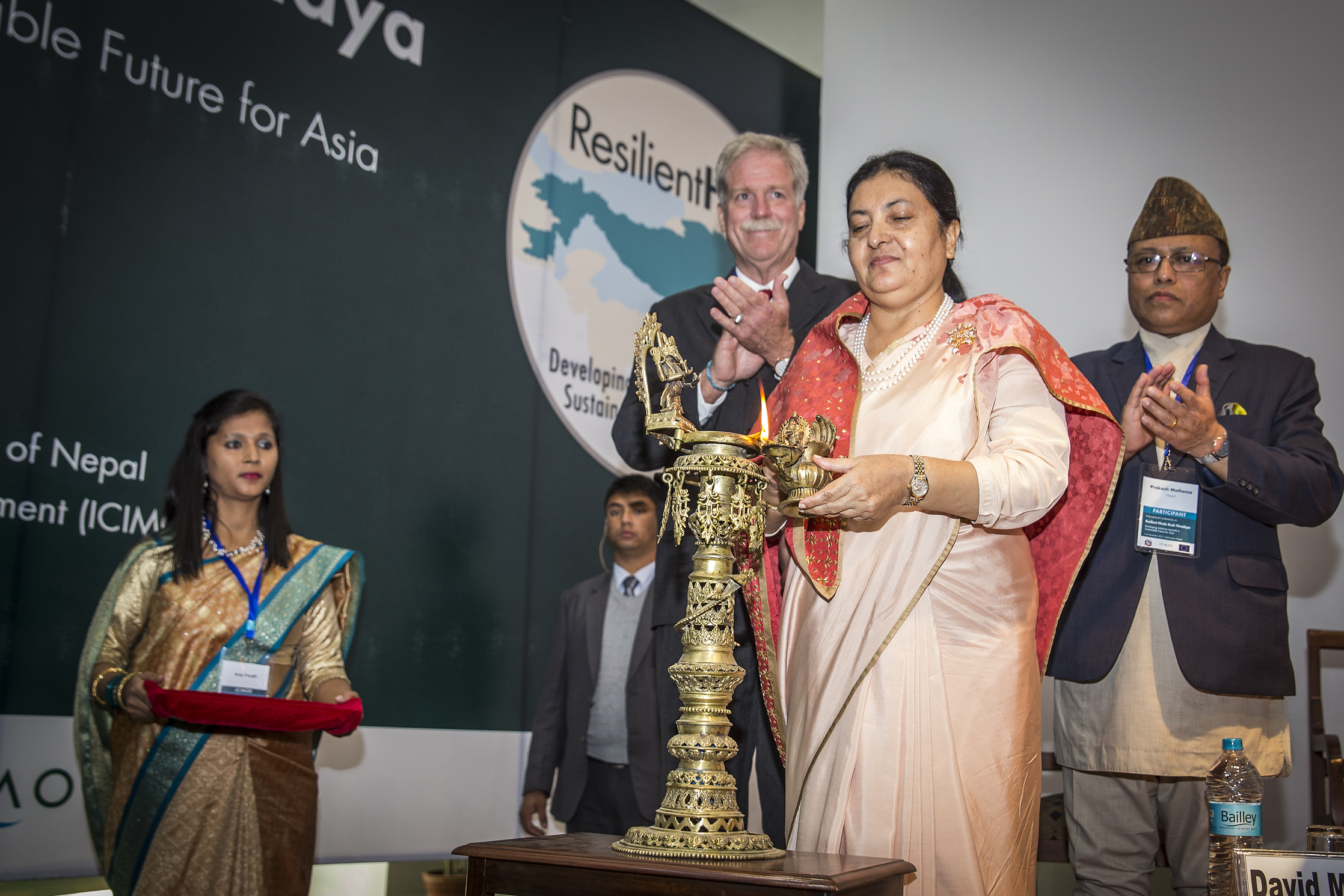By Kanchan Shrestha
— In December 2017, a few days before International Mountain Day, over 400 experts from around the globe gathered in Kathmandu to call for a resilient Hindu Kush Himalaya (HKH). The HKH, one of the most fragile regions of the world, holds significant natural and socio-economic resources that are critical for people far beyond the mountains. Ten major river basins originate in the region providing water and critical ecosystem services for nearly 1.3 billion people. Often referred to as the Third Pole for its vast ice and fresh water reserves, the HKH also faces unprecedented challenges on multiple fronts – climate change, natural disasters, rapid urbanization, air and water pollution, and increasing human mobility.
To take stock of these challenges and identify solutions, “Resilient Hindu Kush Himalaya: Developing Solutions towards Sustainable South Asia and Beyond” provided just the platform for researchers, policy makers, practitioners, youth and media. The conference was organized by International Center for Integrated Mountain Development (ICIMOD) and Ministry of Population and Environment, Government of Nepal with the support from European Union.
Pre-conference activities such as the youth forum, media workshop and a number of satellite events set the stage for main conference. Before the inauguration ceremony, findings of the Himalayan Monitoring and Assessment Programme (HIMAP) – inspired by the Arctic Monitoring and Assessment Program – were shared. The HIMAP report, prepared by hundreds of scientists demonstrated the state of knowledge and critical data gaps in the HKH, charting a path for sustainable development. Temperature increase in the region is expected to be higher than the global average, mainly due to the unique landscape of tall mountains. By 2100, one-third of the ice in the HKH may be lost even if the average rise in global temperature in maintained within 1.5 degrees Celsius.
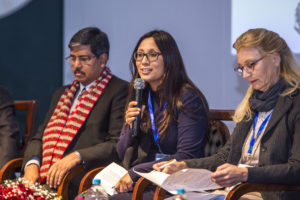
Rojina Manandhar from the UNFCCC Secretariat speaks about the need for inclusive and scalable actions.
Photo: Jitendra Raj Bajracharya/ICIMOD.
Right Honorable President of Nepal, Bidya Devi Bhandari inaugurated the conference among high level representatives of Bangladesh, India, Bhutan, Nepal, European Union and Australia and participants from 26 countries. She addressed the major theme of the conference – regional cooperation at all levels of governance. “The HKH is home to many developing nations and it is imperative that we take collective steps to alleviate the threats of climate change”, she said. This idea was echoed by other panel members. “Our economy is deeply interdependent, and working together and supporting each other is important,” said Yeshey Dorji, Minister of Agriculture and Forests, Royal Government of Bhutan.
Deliberations and discussion on key challenges and building blocks of science, policy and practice for resilience building took place on the second day. Sir Partha Dasgupta expressed the need for more inclusive indicators that take social, economic and religious factors into account rather than standalone indicators such as Gross Domestic Product or happiness (as evaluated in Bhutan). Other sessions also emphasized the need for holistic and integrated institutions and policies to address complex challenges in the future. Participants dived into focused discussions on achieving gender and social equity, sustaining mountain ecosystem and biodiversity, and water, food and energy security, adapting to climate change and managing disaster risks, and building economic opportunity. The outcomes of these discussions were reflected in Action Agenda at the end of the conference.
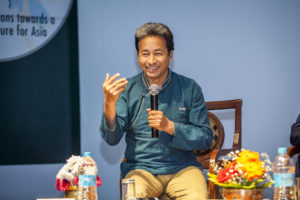
Sonam Wangchuk shares his passion for innovative education that can help solve challenges we face now and in the future.
Photo: Jitendra Raj Bajracharya/ICIMOD.
During the breaks, excited groups of youth and adults alike lined up for a photo with Sonam Wangchuk, the founding director of the Students’ Educational and Cultural Movement of Ladakh, whose story was popularized in the movie, Three Idiots. Wangchuk is known for his innovative teaching methods and his creation, the ice stupa, that stores water during winter and release water in spring when the water is needed the most. In his presentation, Wangchuk urged the audience to invest in youth and education to change social mindsets. “I play with sun, earth, ice, fire and children, as these are the most important elements that make mountains most resilient,” he said.
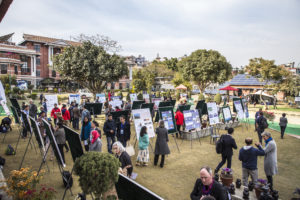
Poster presentations.
The solutions marketplace also drew a large crowd to view more than 25 stalls demonstrating innovations that have brought change to the lives of mountain people and ecosystems. Among the many products on display were high value mountain goods like honey, tea and yak milk products. Low-cost and efficient technologies were also demonstrated such as the innovative cargo bicycle, flood early warning systems, flood resilient eco-san toilets, and integrated water management practices. Across the road from the market place, young scientists presented posters about their research to the conference participants. Twenty posters had been selected from more than 90 submissions from ICIMOD’s eight member countries.
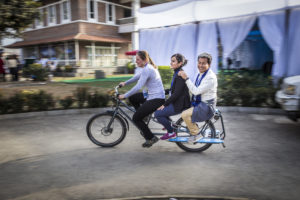
Sonam Wangchuk and ICIMOD colleagues try the innovative solution from the market place – Portal Bikes.
Photo: Jitendra Raj Bajracharya/ICIMOD.
On day three, discussions turned to capitalizing on opportunities and mechanisms for integrating the building blocks for resilience. A common message emerged from the four different parallel sessions: that mountain specific solutions are needed that put people at the center, including women and youth. The sessions also recognized that “HKH challenges are often trans-boundary and geo-political in nature that need transformative, inclusive, collaborative, and scalable actions at all governance levels”, Rojina Manandhar, UNFCCC Secretariat, Germany.
On the final day of the conference, Dr. David Molden, the Director General of ICIMOD, said “The strength of our resilience building efforts will depend on the strength of our common narrative”.
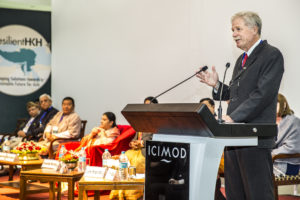
Dr. David Molden, Director General of ICIMOD.
At the final session, the participants unanimously adopted a 12-point agenda that had been crowd-sourced throughout the conference. The Action Agenda called for strengthening the global voice of the HKH region and encouraging mass promotion of simple and affordable technologies for building resilience.
A 12-point Action Agenda for a Resilient HKH:
- Strengthen the regional and global voice of the HKH region
- “HKH Calling…”, a regional awareness to action campaign.
- Encourage mass promotion of simple, affordable and replicable resilience-building technologies and solutions
- Promote and strengthen cooperation at all levels across the HKH region
- Strengthen and build capacity at all scales of governance, and interlinkages,
- Allocate significantly greater resources to resilience building, including incentives for conservation of benefits from mountain ecosystems and equitable benefit sharing.
- Support the incubation of businesses and the formation of cadres of mountain entrepreneurs particularly among women and youth.
- Encourage the use of innovative ICT, RS, and GSS technologies for data and information generation and sharing.
- Build long-term funding arrangements that are consistent, flexible, and responsible.
- Respond to existing and new gender spaces.
- Invest in mountain youth and engage them.
- Establish and mobilize ICIMOD as a regional forum for knowledge generation, repository, and dissemination.
The 12th point of the agenda – which was consistently raised during the conference – called to establish and mobilize ICIMOD as a regional forum for knowledge generation, storage, and dissemination. ICIMOD is already working towards this action point.
During the conference, ICIMOD circulated a new volume: a compendium of resilience-building solutions that have been developed, tested and validated by ICIMOD through its work in the HKH for 34 years. The approaches and technologies presented in the book provide valuable information to communities, practitioners and decision makers.
In closing, Secretary Prakash Mathema from the Ministry of Population and Environment, Government of Nepal, highlighted that urgent action and partnership are needed now for creating a resilient Hindu Kush Himalaya.
Kanchan Shrestha is the Koshi Basin Programme Coordinator at International Centre for Integrated Mountain Development

